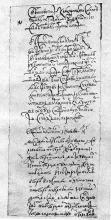Daniel C. Waugh and Ingrid Maier, Cross-Cultural Communication in Early Modern Russia: Foreign News in Context. Seattle and Uppsala, 2023. [2], 893 pp., with 61 illustrations.
DOI: https://doi.org/10.6069/XCSQ-BF71
An open-access book in electronic format published in ResearchWorks at the University of Washington libraries. The volume may be downloaded from the ResearchWorks webpage accessible though the DOI link above.
The book is licensed under Creative Commons Attribution-NonCommercial-NoDerivs 3.0 United States.
This is a work about the acquisition of foreign news in Russia, an attempt to determine its significance not only for government decision making but also for the cultural changes which were underway there during the seventeenth century. The core material for the study is the kuranty, the Russian translations from periodical newspapers and separates, most of them published in Dutch or German in the major European commercial centers. However, the Muscovite government regularly acquired foreign news from many other sources, both written and oral. Their analysis is essential too if one is to understand the importance of the kuranty. What was the institutional context within which such news was being obtained and processed? Who were the individuals involved? How accurate were the translations. How accurate was the news? Contextualization also invites serious consideration of how the foreign news was treated and understood in Europe, where there was a communications ‘revolution’ underway. Might there not be some similarities with what was happening in Russia, at the same time that there are significant differences? Do we see here evidence of ‘influence’, or might it not be better to think of ‘creative adaptation’ within a framework of existing pragmatic solutions to the challenges of obtaining essential information? The book thus has a broad comparative aspect which should offer new insights into the cultural, intellectual, and social history of early modern Russia and contribute as well to the study of the information revolution elsewhere in Europe.
